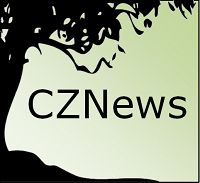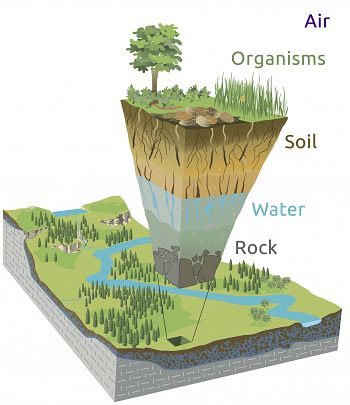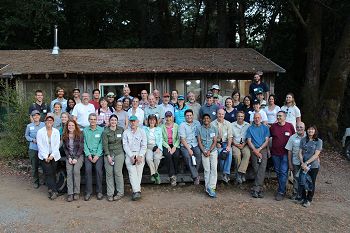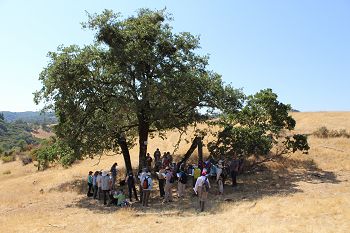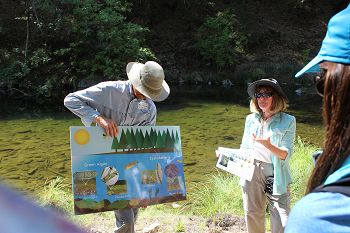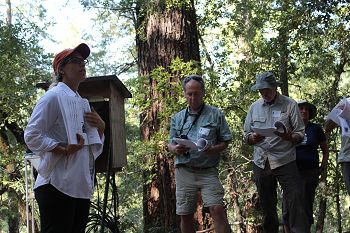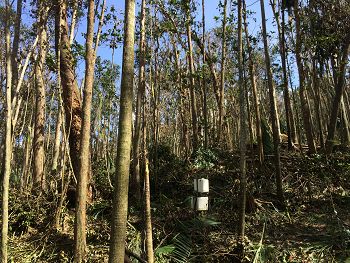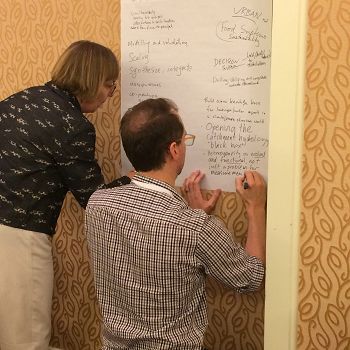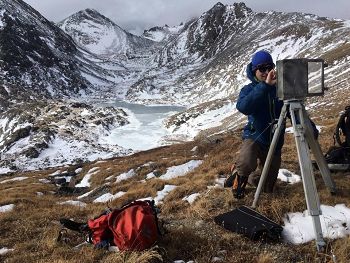CZNews: Fall 2017
Print Verison: CZNews - Fall 2017 (2 MB PDF)
CZO PI Meeting at Eel River CZO
The Eel River CZO (ERCZO) hosted a site visit on September 9-11 in Fort Bragg, CA. One PI and another investigator from each CZO attended along with members of the CZO National Office and Steering Committee, and NSF Program Officers. Attendees traveled to the Angelo Coast Range Reserve on Day 1 to visit instrumented and other field sites within the ERCZO. CZO team members presented and lead discussions on topics including watershed dynamics, tectonic activity, fish surveys and hydrodynamic modeling. Day 2 included a field tour of the Sagehorn-Russell Ranch, a privately owned working cattle ranch in Mendocino, CA. Research topics at the ranch included the relationship between rock moisture and vegetation, an intensive field investigation of Mediterranean oak ecophysiology, and drainage of the CZ. On the final day, participants met at UC Berkeley for updates on cross-CZO modeling collaborations (Praveen Kumar - IML) and the CZO Data Manager’s Working Group efforts and recent workshop (Colin Bode - ERCZO). Thank you to all who planned, presented and participated in a productive and informative site visit!
Hurricanes impact Luquillo Mountains CZO in Puerto Rico
Hurricanes Irma and Maria made landfall in Puerto Rico last month causing devastating impacts to the island including within the El Yunque National Forest. Located in the Luquillo Mountains on the northeastern part of the island, the 28,000-acre forest is home to the Luquillo Mountains CZO, the Luquillo Long-Term Ecological Research (LTER) station, and the only tropical rainforest in U.S. Forest Service (USFS) system. Studied for decades, this tropical forest is one of the most biologically diverse of the USFS system, being home to hundreds of animal and plant species, some of which are only found here. The once dense tree canopy was defoliated by the category 4 hurricanes, allowing sunlight and heat to reach the forest floor and leaving trees bare or uprooted. Concern remains after such major events over the forest’s capacity to capture annual rainfall that accounts for 20% of the island’s drinking water. Research personnel from the local El Verde Field Station were safe and continue to work to resume monitoring in areas of the forest they have access to. We appreciate their efforts. An update on the damage at the Luquillo CZO from PI Bill McDowell (UNH) can be found on criticalzone.org. The upcoming AGU Fall Meeting has added late-breaking sessions related to the 2017 Hurricane Season in the Americas (Harvey, Irma, Jose, Maria) with abstracts due November 1st. To help with recovery efforts in Puerto Rico, please consider donating to United Puerto Rico.
Upcoming Events
- AGU Fall Meeting 2017, December 11-15, New Orleans, LA
- CZO Town Hall at AGU, December 14, New Orleans, LA
- CZO-LTER-NEON-ISMC Joint Modeling Workshop, February 13-15, Boulder, CO
- GSA Northeastern Section Meeting 2018, March 18-20, Burlington, VT
- GSA Joint Section Meeting 2018, May 15-17, Flagstaff, AZ
CZO Spotlight: CZO Arlington Meeting discussion open till Nov. 5th
The June 2017 Arlington Critical Zone Observatory All Hands Meeting was an NSF-sponsored workshop to assess the current state of Critical Zone science and consider how the next iteration of a Critical Zone science program can address key scientific, societal and educational questions about the Critical Zone. Following this meeting, a white booklet “New Opportunities for Critical Zone Science” was drafted to express to the public and broader research community the ideas generated and to emphasize the knowledge shared during the meeting. The document is divided into the following sections: 1) critical zone knowledge learned over the past decade, 2) compelling critical zone questions for the coming decade, 3) the next generation of critical zone observatories and approaches, and 4) critical zone education and outreach initiatives. The booklet is available for public discussion on CZEN.org through November 5, 2017. The authors encourage and look forward to hearing your thoughts on how CZ science can continue to grow. Please visit www.czen.org/2017-new-opps-booklet for information on how to contribute to this discussion.
CZO Graduate Research Group
The CZO Graduate Research Group has organized a webinar series for graduate students and postdoctoral fellows to share current research and seek feedback on developing ideas. The series, organized by Kate Hale (CU Boulder), Theodore Barnhard (CU Boulder), and Shane Putnam (Johns Hopkins), serves as a nexus for crossing disciplinary boundaries. The first webinar on September 14th had presentations from Zachary Brecheisen (Duke) on land-use effects on soil C biogeochemistry, and Adam Wlostowski (CU Boulder) on his examination of hydrologic patterns across CZOs. The second webinar on October 12th featured research on how soil controls the movement of elements in the CZ. Presentations included Nicholas Dove (UC Merced) on fire effects on soil biogeochemistry, Ravindra Dwivedi (UArizona) on tracing impacts of deep soil hydrology on stream chemistry, and Justin Richardson (Cornell) on mercury sequestration in the CZ. The series has been attended by graduate students both working at a CZO and from outside the network. The next CZO Graduate Research Group webinar will be on November 9th at 3:30 pm ET. Graduate students either participating or interested in CZ science are welcome to attend. For information about participating in this upcoming webinar, please contact Justin Richardson (jbr89@cornell.edu).
ILTER-RZA-CZO Joint Meeting
A joint conference of the International Long Term Ecological Research Network (ILTER) and LTER France - Zones Ateliers Network (RZA) & Critical Zone Observatories OZCAR Network - was held in Nantes, France on October 2-8, 2017. Attended by 188 participants from 30 countries, the meeting included three days of presentation and poster sessions followed by a two-day ILTER Coordinating Committee meeting and a two-day field trip to field sites of the Zones Ateliers Network. The purpose of the joint conference was to bring together scientists, engineers, program managers and policy makers to exchange knowledge, to share experiences and research results, to discuss the most recent developments and applications to environmental considerations, as well as prospective research. Research presented covered both scientific and social research covering a span of environments from polar to urban. Members of the U.S. CZO program in attendance included Luquillo CZO PI Bill McDowell (UNH) who serves as a member of the ILTER Scientific Committee, Calhoun PI Dan Richter (Duke) who gave a keynote talk “Darwin, Lyell, Ecosystems, & Earth’s Critical Zone”, and Sarah Sharkey (PSU) representing the CZO Science Across Virtual Institutes (SAVI) Project.
CZNews
Receive the CZO Email Newsletter
Occasional email will include news, events, and other info related to Critical Zone Observatories.
We hate spam as much as you do, so your information will never be shared. You can unsubscribe at any time.
"Modified from Chorover, J., R. Kretzschmar, F. Garcia-Pichel, and D. L. Sparks. 2007. Soil biogeochemical processes in the critical zone. Elements 3, 321-326. (artwork by R. Kindlimann).
Group photo of attendees and presenters after the first day in the Eel River CZO at the Fox Creek Lodge. Photo: Justin Richardson
Jesse Hahm, PhD student at UC Berkeley, detailing his research activities on the impacts of shallow soils on plants under an instrumented Gary Oak at Sagehorn Ranch, Eel River CZO. Photo: Justin Richardson
Dr. Mary Power and PhD student Keith Bouma-Gregson of UC Berkeley explain the impact of cyanobacteria and algae on steelhead trout in the Eel River and its toxic impact on visiting canines. Photo: Justin Richardson
Photo: Omar Gutiérrez del Arroyo
Participants in a breakout group at the CZO Arlington Meeting in June. Photo: Sarah Sharkey
Photo: Boulder Creek CZO
The International Long Term Ecological Research Network (ILTER) and LTER France - Zones Ateliers Network (RZA) & Critical Zone Observatories OZCAR Network logos
Dr. Daniella Rempe, former graduate student at UC Berkeley, presenting her research on the deep hydrology of the deep Critical Zone at Rivendell site in the Eel River CZO.
News Category:
EDUCATION/OUTREACH
Related News
Explore Further
